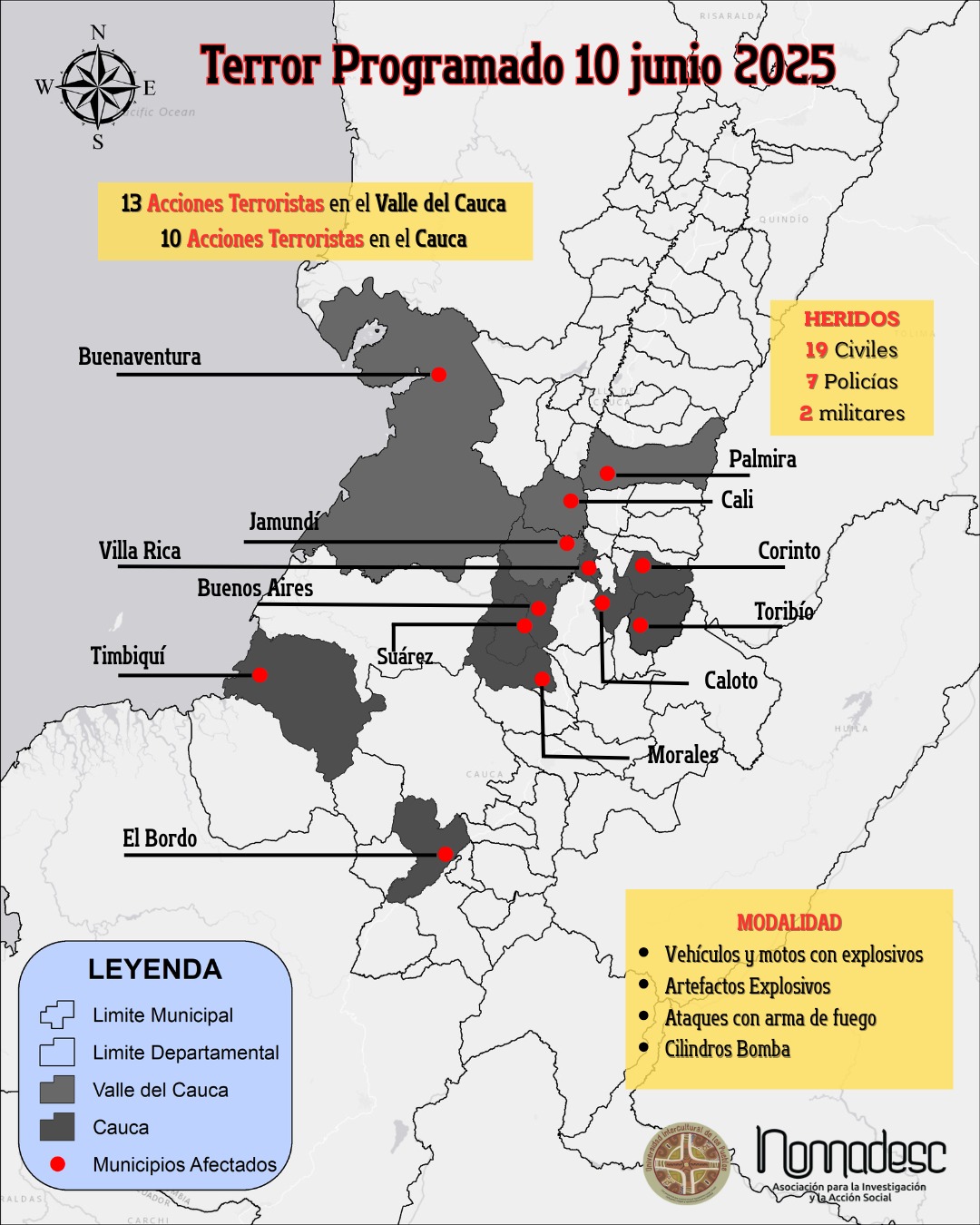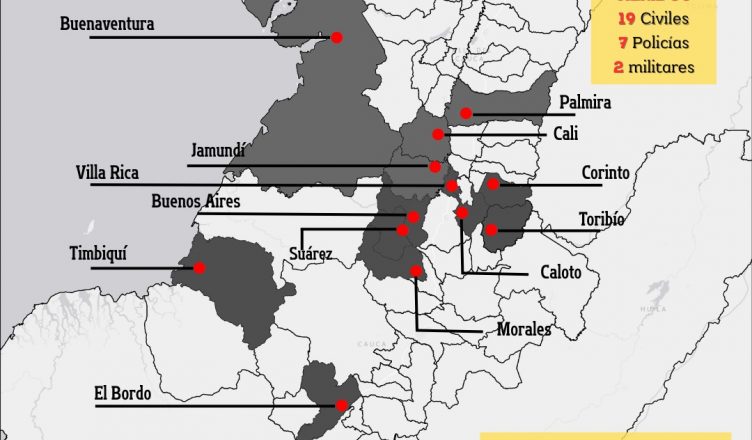CLEAR INTENTION TO BREAK THE SOCIAL FABRIC AND ORGANIZATIONAL
POWER IN SOUTHWESTERN COLOMBIA.
In Colombia, on average, every two days, a human rights defender,
ethnic-territorial leader, or defender of people’s rights is murdered.
Cali June 10, 2025
The Nomadesc association and the Intercultural University of the Peoples (UIP) have been
alerting the Colombian State for several months about the worsening armed conflict, the
humanitarian crisis, and the complete disregard for human rights and international
humanitarian law in southwestern Colombia. We express our concern and urge the
Presidency, the Vice Presidency, the Ministry of Equality, the Ministry of the Interior, and
investigative bodies such as the Attorney General’s Office, the Prosecutor General’s
Office, and the Ombudsman’s Office, to conduct realistic assessments of the situation.
These evaluations should aim to identify the true causes of the escalating violence in
Colombia, hold the real perpetrators accountable, and uncover the relationships between
legal and illegal armed groups.
From 10:00 p.m. on June 9, 2025, to 9:00 a.m. on June 10, 2025, events in the southwest
of Colombia and along the Pacific coast contributed to a deepening state of fear and
anxiety in the region. This turmoil is primarily driven by drug trafficking activities and illegal
mining, which have led to forced displacement and confinement. There has also been a
resurgence of invisible borders, along with incidents of extortion, robbery, forced
disappearances, and murders. Additionally, there has been a significant increase in the
recruitment of children and adolescents into these activities. These practices
disproportionately affect the ethnic and territorial rights of indigenous, Black, and peasant
communities in both urban and rural areas.
We regret to report that the recent attacks have left 36 people injured, including three
minors, and have resulted in the deaths of five individuals.1 These terrorist acts are not
isolated incidents but rather reflect a broader reality that has been reported in recent
years. They clearly aim to showcase the destabilizing power of the armed group
responsible for the twenty-four simultaneous attacks that occurred in the municipalities of
Buenaventura, Jamundí, Villa Rica, Palmira, Corinto, Caloto, Buenos Aires, and Cali.
Whether motivated by the anniversary of alias Mayimbu or an attempt to undermine the
presence of President Gustavo Petro, who is scheduled to attend a rally for Peace and
Democracy on Wednesday, June 11, at Plaza San Francisco, these attacks signify a
serious threat. (See press releases.)2
We have highlighted the urgent necessity to cease the insistence on quick peace
processes, as they often neglect the immediate needs of communities, populations, and
social sectors. We advocate for initiatives that rebuild trust in civil institutions,
demonstrating their ability to govern by thoroughly addressing the humanitarian crises
faced by municipalities affected by displacement and the confinement of their residents.
Planned terror is often accompanied by orchestrated impunity, which empowers both the
masterminds and, in some cases, the perpetrators of these acts. In instances like the
victims of the Buenaventura Civic Strike, crucial files are lost. Moreover, irrelevant
charges are sometimes brought against individuals accused of crimes against humanity,
with no security measures implemented to protect witnesses or victims. This pattern of
abuse includes threats to witnesses and victims, as seen in the cases of young people
who were murdered or young women who experienced sexual abuse during the strikes
in 2017 (Buenaventura and Chocó), 2019 (National strikes, utilizing techniques of
collective panic), and 2021 (National strikes, with the highest number of victims reported
in Cali).
We emphasize that the lack of accountability and the failure to adhere to state
commitments and agreements—such as those related to the Buenaventura Civic Strike,
rulings from the Constitutional Court T462A, T550, directives 04 and 05, the agreements
following the social outbreak in 2021, and many other unfulfilled promises in the region—
leave unprotected those who courageously participated in mobilizations and protests
during the presidencies of Álvaro Uribe, Juan Manuel Santos, and Iván Duque.
The highly complex armed conflict in Colombia has significant impacts on social
organizations and human rights defenders. Between 2024 and 2025, 63 social leaders
from eight grassroots organizations associated with the UIP received death threats, and
four of these leaders were murdered.
The group commonly referred to as «FARC dissidents,» based on their recent statements
displaying their signatures and insignia, is believed to be responsible for the attacks that
occurred on June 9 and 10. They are also linked to the intimidation and threats directed
at social leaders and human rights defenders, as well as the mass and forced recruitment
of children, youth, and adolescents.
These dissidents are allegedly using financial promises to co-opt individuals, circulating
resources for housing improvements and offering «employment» by hiring and paying
salaries to those they forcibly recruit into their ranks. However, the promise of work is
nothing more than a trap, reflecting a strategy similar to the 6,402 cases of young victims
of state crimes, inaccurately referred to as False Positives.
The dominance of these groups over territory and daily life violates all principles of
International Humanitarian Law (IHL). The civilian population has become a permanent
human shield, as members of these groups occupy their homes and increase the risk of
violent sexual abuse against women, children, adolescents, and young people particularly
from Black, Indigenous, and rural communities.
“In Colombia, the United Nations has verified over 1,000 cases of recruitment, use, and
exploitation of children and adolescents for armed conflict since 2019. It has also noted a
concerning rise in these crimes in recent years, with a significant spike in 2023 when the
number of cases doubled compared to 2022. This upward trend has continued into
2024.”3
The proposal for «total peace» has not succeeded in reducing genocidal practices against
social leaders. Territorial dispossession and mass displacement are on the rise. At the
beginning of 2025, “the Ombudsman’s Office reported 209 risk events related to
displacement and/or confinement, with the departments of Cauca, Nariño, and Caquetá
being the most affected.”4 Four databases have documented 505 families, totaling 1,139
individuals, in Antioquia, Valle del Cauca, Nariño, and Cauca. Between January and March
2025, over 121,000 people were reported to have been forcibly displaced in both mass
and individual events. The situation in Catatumbo (Norte de Santander) is particularly
alarming, with a significant increase in the number of displaced individuals.
The lockdown became one of the most severe measures, restricting people’s ability to
leave their communities or receive visits from family and friends. Since January, at least
71,000 individuals have been affected by these mobility and access restrictions. The
absence of humanitarian assistance and a response to the needs of those impacted has
worsened the situation. Armed conflict and the illegal seizure of land by armed groups
threaten the survival, dignity, and sovereignty of ethnic communities.
Prior to the humanitarian crisis in Catatumbo, which we deeply regret and have openly
addressed, social, territorial, and human rights organizations in the southwest and Pacific
regions warned the national government about the escalating armed conflict. This
escalation was driven by the actions of the Gulf Clan (also known as AGC) and El Estado
Mayor Central FARC (the Central General Staff of the FARC). These groups bolstered
their military capabilities, resulting in severe humanitarian consequences for Black,
peasant, and Indigenous communities.
Fact-checking missions examining the actions of these groups, as well as those of the
National Army, have not included public officials empowered to make decisions, leaving
the civilian population entirely unprotected.
It is crucial to activate protective mechanisms that ensure human rights defenders and
social leaders in the communities have the necessary guarantees to carry out their work.
Lasting peace in the region requires a continuous commitment to the presence of
the State’s civil institutions, which have historically been denied to the communities
of southwestern Colombia, along with the strengthening of self-governing
structures.
11 see: https://www.infobae.com/colombia/2025/06/10/atentados-valle-y-cauca-fundacion-valle-del-lili-alerto
sobreocupacion-de-urgencias-del-300-y-revelo-estado-de-21-heridos/
2Admiral Francisco Cubides, commander-in-chief of the Armed Forces, confirmed that, according to military
intelligence analysis, those responsible are “the residual structures of the FARC dissidents, the Jaime Martínez,
Carlos Patiño and Dagoberto Ramos groups,” all from the bloc commanded by the alias “Iván Mordisco.”
3https://www.unicef.org/colombia/historias/dia-de-las-manos-rojas-2025
4Ombudsman’s Office. Bulletin on the dynamics of forced human mobility in Colombia, 2024.

